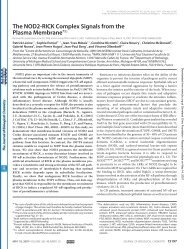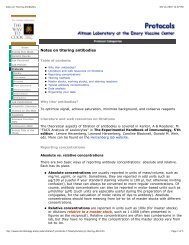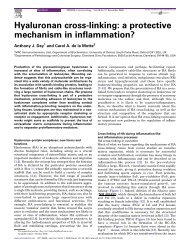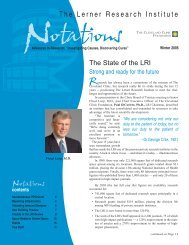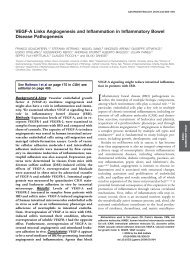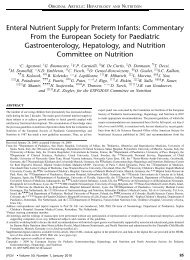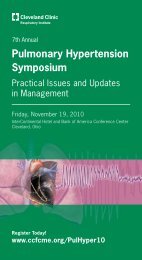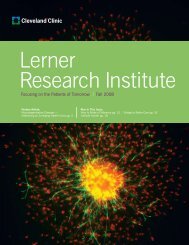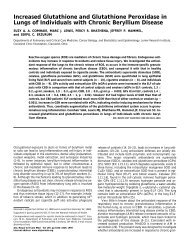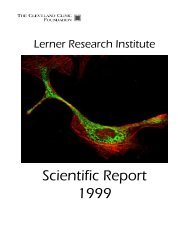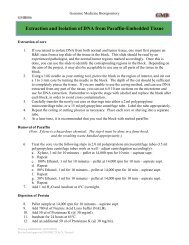Scientific Report 2003-2004 - Cleveland Clinic Lerner Research ...
Scientific Report 2003-2004 - Cleveland Clinic Lerner Research ...
Scientific Report 2003-2004 - Cleveland Clinic Lerner Research ...
- No tags were found...
Create successful ePaper yourself
Turn your PDF publications into a flip-book with our unique Google optimized e-Paper software.
Traditional approaches to the treatment ofbrain tumors focus on the hypothesis thattumors arise and grow as a consequence ofdisordered regulation of proliferation. It hasbecome apparent that tumor growth depends notonly on the rate of cellular proliferation, but alsoon the rate of cell death. Apoptosis is a“physiological” form of cell death, which isactively controlled by a number of signaltransduction pathways that act to regulate theactions of a unique set of genes and geneproducts. In a number of organ systems,dysregulation of apoptosis contributes directly totumor development,progression, and resistance tochemotherapy. Recentstudies have helped todevelop an increasedunderstanding of specificproteins responsible for theregulation of apoptosis. Thisknowledge may allowdevelopment of clinicaltherapies directed at alteringlevels of expression ofspecific pro-apoptoticproteins, which maypotentiate effects ofchemotherapeutic agents.The most importantgenes/gene productsidentified in the control ofDNA damage-inducedapoptosis include p53,members of the bcl-2 genefamily, the caspases, andcytochrome c, amongstothers. Previous work hasThe Department of Cancer BiologyMolecular Genetic Approaches UnravelRegulation of Apoptotic Pathwaysin Malignant Brain TumorsMichael A. Vogelbaum, M.D., Ph.D.Center for Molecular Geneticsdemonstrated that more than 50% of malignantgliomas have mutations of p53, thereby increasingthe resistance of these tumors to DNA damageinducedapoptosis. Restoration of wild-type p53to gliomas having a mutant, but not a wild-type,p53 genotype results in spontaneous apoptosis. Incontrast, overexpression of bax, a pro-apoptoticmember of the bcl-2 gene family, in gliomas havinga wild-type, but not mutant, p53 genotype alsoresults in spontaneous apoptosis. Finally, gliomaswith a wild-type p53 genotype that are subjectedto a DNA-damaging stimulus fail to transactivatebax (a known target of P53) and fail to undergoapoptosis.We have generatedthe following hypothesis toaccount for this set ofobservations: DNAdamage-induced apoptosisin glioma cell lines requiresactivation of wild-typeP53, which results in bothbax transactivation andactivation of a separatesignal transductionpathway (which we havetermed the “death signal”transduction pathway) thatis distinct from itstransactivation of bax.The major focus of mylaboratory is to establishthe validity of thishypothesis in malignantglioma cell lines and inprimary cultures of tumorstaken from the operatingroom.THE VOGELBAUMLABORATORYPOSTDOCTORAL FELLOWUtpal Datta, Ph.D.TECHNICAL ASSISTANTSDmitry LeontievChunbiao LiCOLLABORATORSGene Barnett, M.D. 1S. Jaharul Haque, Ph.D. 2Bryan R.G. Williams, Ph.D. 21Brain Tumor Institute, CCF2Dept. of Cancer Biology, CCFVogelbaum, M.A., Tong, J.X., Higashikubo, R., Gutmann, D.H., and K.M. Rich (1998) Transfection of C6 glioma cells with the bax gene andincreased sensitivity to treatment with cytosine arabinoside. J. Neurosurg. 88:99-105.Vogelbaum, M.A., Tong, J.X., Perugu, R., Gutmann, D.H, and K.M. Rich (1999) Overexpression of Bax in human glioma cell lines. J.Neurosurg. 91:483-9.Rahaman, S.O., Sharma, P., Harbor, P.C., Aman, M.J., Vogelbaum, M.A., and S.J. Haque (2001) IL-13Rα2, a decoy receptor for IL-13, actsas an inhibitor of IL-4 dependent signal transduction in glioblastoma cells. Cancer Res. 62:1103-1109.Prayson, R.A., Castilla, E.A., Vogelbaum, M.A., and G.H. Barnett (2002) Cyclooxygenase-2 (COX-2) expression by immunohistochemistry inglioblastoma multiforme. Ann. Diagn. Pathol. 6:148-153.Rahaman, S.O., Harbor, P.C., Chernova, O., Barnett, G.H., Vogelbaum, M.A., and S.J. Haque (2002) Inhibition of contitutively active Stat3suppresses proliferation and induces apoptosis in glioblastoma multiforme cells. Oncogene 21:8404-8413.61



